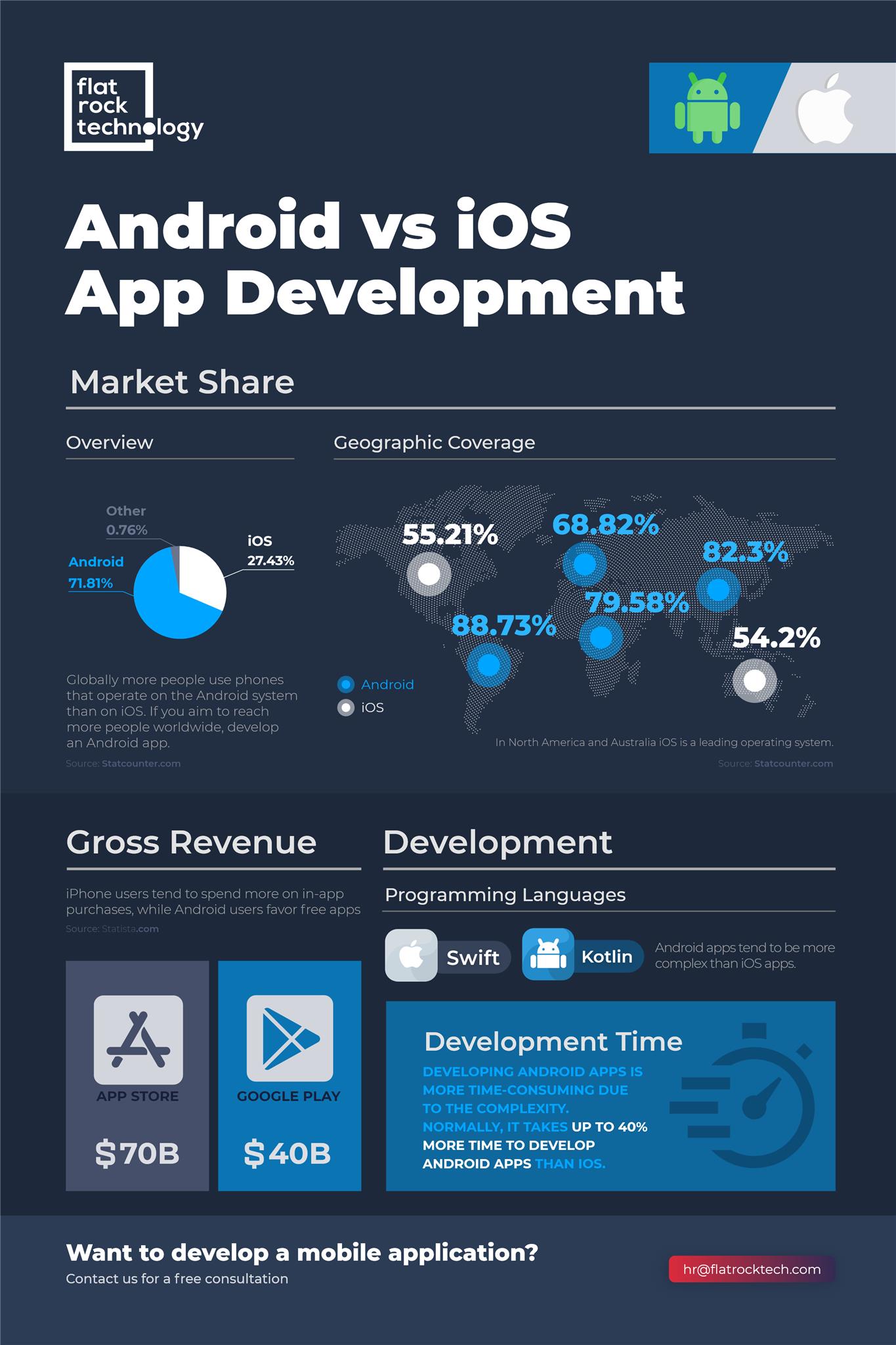When you want to develop an app for your business, the first decision you have to make is whether you should create an app for Android or iOS.
While eventually, you might be planning to have an app for both platforms, business owners and developers usually prefer to develop one system first.
It is a common practice that many developers follow. For example, Instagram was first launched on iOS, and the Android version came out only after two years. Another popular app, Clubhouse, was released for an iOS operating system in 2020, Android version followed in 2021.
Launching an app on one platform has few advantages:
- You can see how users interact with it, what features to add, remove or improve.
- The public already knows about your app, and you can acquire new users easily for your Android or iOS app (depending on which one you develop first).
- If you have to make changes in your app, it is easier to do it on one app and create a second version of your app accordingly. Hence there is a lower risk of spending time and money resources.
Once the first version of your app is established and successful, you can launch it on another platform. But which platform should you develop your app for first - Android or iOS?
Developing for Android VS iOS - how to decide
Both platforms have their advantages and disadvantages. The choice between iOS and Android comes down to five main factors you need to consider from the business point of view:
Target Audience
Ask the following questions:
- Who will be using your app?
- Where do they live?
- Which demographics do you want to reach?
Revenue
Ask the following questions:
- How are you going to generate revenue from the app? From app monetization, ads, in-app purchases, premium account?
Complexity and Time
Ask the following questions:
- How complex is your app?
- Is it your top priority to have the app launched in a shorter time?
Cost
Ask the following question:
- What is your budget for developing the app?
Features
Ask the following question:
- What kind of features should the app have?
Answering these questions will help you understand your needs better and decide which system to use for your mobile app development.
Android apps help you reach a wider global audience
One of the most important things to consider before choosing between Android and iOS systems is the audience you want to reach. Android and iPhone are attracting users with different types of geographical and demographic characteristics.
If we look into the percentage of iPhone users VS Android, we'll see that globally, more people use phones that operate on the Android system than iOS. In most European, Asian, African, and South American countries, Android phones have a much bigger market share. Android is also growing in popularity in emerging markets, such as Asian, African, and Latin. In 2020 Android had a 71.81% market share, while iOS had only 27.43%. However, In North America and Australia, iOS is a leading operating system.
There is a demographic difference between Android and iPhone users as well.
- Slightly more men prefer Android, while women tend to favor iPhone.
- Apple users are younger (iPhone has a greater market share in the age range of 18-24).
- Android users tend to work in technical jobs, iPhone users are more likely to work in managerial positions.
The way users interact with the apps is different too. iPhone users spend more time on apps and are usually more engaged with them than Android users.
Considering it, if you want to reach a global audience with your app, it is better to develop it on the Android system first. If your target audience is the United States, Western European countries, or Australia, your best bet would be iOS.
iOS is better for monetizing app without ads
If you plan to monetize your app, you need to also consider Android and iPhone users' behavior when it comes to spending money in-apps.
Android users usually favor free apps and are not spending much on in-app purchases or premium versions. Due to this, free apps with in-app ads are more common on Google Play.
iOS users, on the contrary, are more willing to pay for apps, get premium accounts or make in-app purchases. App Store generates almost twice as much annual revenue as Google Play, even though Google Play has twice as many downloads.
Hence, choosing between Android VS iOS systems for your first version of the app depends on how you plan to generate money from your app (if you plan for it at all).
For those, who are planning to monetize apps with in-app ads, Android is a better option. You will reach a broader audience and get more downloads. If you are planning to generate revenue without in-app ads, iOS would be a better choice.
Developing iOS apps can be easier and faster
Another thing you might want to look into is the complexity of developing the app. The more complex an app is, the more time it needs for development.
Android applications are usually more complex to develop and thus take more time. It is because of the programming languages and fragmentation. The programming language used for android app development is Kotlin (lately, Kotlin is more widely used for Android app development than Java, which was previously the go-to language for it). The programming language for iOS is Swift, an official programming language of Apple.
The key difference between Android and Apple is that Android is an open-source platform. It means that there is a lack of standardization, and there are many devices and components.
Unlike Android, Apple has a closed eco-system. Due to this, there are few standardized operating systems and devices.
When you develop an app for Android, you need to consider fragmentation. There are multiple devices, so you have to consider their screen sizes and aspect ratios so that your app is suitable for most of them.
It might take approximately 30% longer to develop an Android app. Thus, if time is important to you and you want to launch a new app soon, it might be better to create it for iOS first.
Android VS iOS: the cost of development
Another thing to consider when choosing between Android VS iOS is the cost of app development. When it comes to the costs there is no clear answer as the operating system is just one of the many factors that influence the cost.
The cost of development highly depends on the functionalities, complexity, and scope of the project. It might also vary from company to company, and the range of an hourly rate might be from $25 to $500 and more.
Thus, one cannot clearly say which one would be more expensive - developing an Android app or iOS. However, there are few things you can consider.
As mentioned above, developing an Android app might be more complex and take slightly more time. Which, in some cases, could increase the cost of development
If you want to work with freelancers to develop your app, iOS development would probably be more expensive than Android simply because of the initial cost.
But again, it all depends on the app itself and the company you hire for development. At Flat Rock Technology, there is no difference between the costs of Android and iOS mobile app development. It gives businesses the ability to choose the platform that suits their interests and goals best, not worrying about the differences in the costs.
Android VS iOS: Which platform is more flexible?
Development for Android might allow you to be more flexible with the features. Android is open source which means that there is more flexibility when it comes to the features and functions you want the app to have.
Thus, before you decide whether to develop an Android or iOS app think about the features and what degree of flexibility you need with them.

What else to consider
There are few other things to consider, such as security and publishing.
Security
Android VS iOS which one is more secure? The fact that Android is open source means that it is also more vulnerable to malware. Apple, on the other hand, has a closed eco-system and generally is considered to be more secure. However, it does not mean that when you are choosing between Android VS iOS you need to choose between the risk of vulnerability and security.
Publishing
The final step of launching your app is publishing it on App Store or Google Play. It is easier and faster to publish on Google Play than on App Store.
Google Play allows you to publish the app without a strict approval process. Your app might be available for downloads even on the same day.
On App Store, however, the process of approval is stricter and takes more time. Your app will be checked by humans. They might deny it and give you comments to consider before you re-upload again.
There is a difference between publishing costs as well. App Store charges an annual $99, while Google Play has a one-time fee of $25.
Ultimately the choice between developing an Android or iOS app comes down to your business interests and goals. Based on the factors we have discussed; you can decide which will be more profitable for you: To make the first version of your app for iOS or Android.
When to develop for Android first
If you aim to reach more people around the globe and get more downloads, you might prefer to develop for Android first. Specifically, if your target audience lives in South America, Asia, some European countries (mainly Eastern Europe), or Africa. As statistically, people in these regions use Android more widely. As there are more Android users and more downloads, developing the app for Android can be more profitable if you want to monetize your app with in-app ads. You should also think about what features does your target audience wants and if Android allows you to implement those features with more flexibility.
When to develop for iOS first
iOS is a great choice if you want to build a minimal viable product as it can be cheaper and quicker. At the same time, if your target audience lives in North America, Western Europe, or Australia - it might be a better choice to go for iOS. iOS is also a better choice if you want to monetize your apps without in-app ads and if you are going to offer in-app purchases and premium versions of your app as iOS users are more willing to pay for it.
As you can see, choosing between Android VS iOS depends on what kind of app you want to develop and for whom. If you have a project in your mind and cannot choose which one would be the best, our mobile development consultants can give you a free consultation. Once you have developed and launched the first version of the app and users of other operating systems start searching for it, it is a good sign to build another version.



